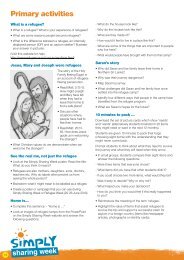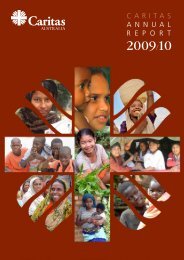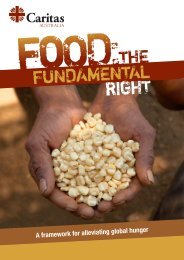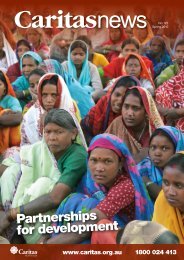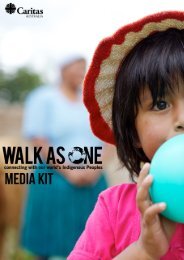View online - Caritas Australia
View online - Caritas Australia
View online - Caritas Australia
- No tags were found...
You also want an ePaper? Increase the reach of your titles
YUMPU automatically turns print PDFs into web optimized ePapers that Google loves.
community, but even then, the mechanicsof sponsoring, recording the progressof each child, translating letters, takingphotos, costs a lot of money. This ismoney which is being spent on the needsof the donor, not of the child.At <strong>Caritas</strong> our development philosophyis rooted in the principle that we, inthe rich world, cannot alone resolvethe issues that perpetuate poverty. Infact dehumanising poverty can onlyever be overcome when a communityis empowered to own the process of itsdevelopment. In this way, we work withentire communities, often with thepoorest of the poor in already very poorcommunities, to bring dignity to theirlives and to build a path by which theythemselves can be the architects of theirown development.Many organisations that promote childsponsorship mention their communityfocus in the fine print because the powerof the emotional pull of the young child,full of potential, is a much strongertrigger to give than the community-basedmethod. Child sponsorship creates astrong personal connection between thewell meaning giver and the ‘poor’ child.The added bonus is you can see thepicture of that child on your fridge andit proves a valuable educational tool foryour own, relatively well off children, thatlife is not so good for everyone. There aremany hundreds of organisations involvedin international development in <strong>Australia</strong>.Internationally there are many thousandsof organisations who aim to assist thoseliving in dire poverty. It is often difficultfor the person who wants to make adifference to choose between the manygroups who do this. The competition inthe aid and development sector, in largepart due to the growing awareness ofinternational poverty issues, is exceedinglydiverse.Many groups who are engaged withtackling poverty have a religiousconnection, like <strong>Caritas</strong> <strong>Australia</strong>.Yet <strong>Caritas</strong> <strong>Australia</strong> does not everproselytise, or attempt to convert peopleto Catholicism or any other religion.Similarly we do not discriminate on anymeasure except need.Regardless of the religion, ethnicity,culture or gender, <strong>Caritas</strong> <strong>Australia</strong> workswith those who are most vulnerable. Theirfaith, or lack of it, is of no interest to us.Some of our partners are Catholic, othersChristian, some are Buddhist, Muslim,Jewish or Hindu and some are of noreligious persuasion at all. As long as theyare building communities to take controlof their futures, we do not discriminate.The <strong>Caritas</strong> <strong>Australia</strong> mission, as partof the Catholic Church, clearly states thatwe must undertake this endeavour. Wework through local partners, many ofthem members of the Catholic Churchand the church’s network.<strong>Caritas</strong> works for the freedom of thosewho are oppressed by injustice, bringing‘sight’ to both those who are powerless andpowerful and proclaiming to the poor thegood news of their human dignity. Thisissues don’t get much consideration.<strong>Caritas</strong> <strong>Australia</strong> very clearlychooses not to promote childsponsorship. We believe it is farbetter to help whole communitiesthrough our partner organisationsthan to sponsor individuals. Avillage well, a community school,a trained primary health worker –these can all help to improve lifefor everyone, rather than just anindividual child.Some sponsorship schemes dosupport projects that benefit theCARITAS NEWS




